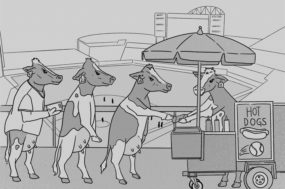World Dairy Expo Seminars Industry experts with a vast array of expertise will converge at World Dairy Expo to help dairy operations be more profitable and efficient as part of the 2011 Expo Seminars. Eight free seminars will be offered during the week of October 4 through 8 at the Alliant Energy Center in Madison, Wisconsin. Learn more about: Livestock Gross Margin for Dairy, genomic testing, communicating with consumers, robotic milking, calf nutrition, somatic cell counts, feed costs and carbon emissions.
Seminars will be showcased each day, Tuesday through Saturday, in the Mendota 2 meeting room, in the Exhibition Hall. APC, Inc., Aspen Dairy Solutions, Badgerland Financial, BASF Plant Science, Dairy Management Inc., DeLaval, Jamesway and Select Sires are sponsors of this year’s seminars.
World Dairy Expo Virtual Farm Tours
Visit dairies from around the U.S. without leaving World Dairy Expo 2011. Virtual Farm Tours will focus on a variety of management topics, including land conservation and forages, technology and innovation, unique marketing, robotic milkers, family transition, milk quality, reproductive success and transition cow management.
These free tours will be presented daily, Tuesday through Saturday, in the Mendota 1 meeting room in the Exhibition Hall. The managers will present a half-hour pictorial view of their operation, including general operation information and highlights of exceptional management practices. Time for questions and discussion will follow.
The tours will be available for viewing on World Dairy Expo’s website after the show. AgSource Cooperative Services, American Jersey Cattle Association, Conestoga-Rovers & Associates, Lely USA, North Carolina Dairy Advantage, Pioneer Hi-Bred and Quality Liquid Feeds are sponsors of the 2011 Virtual Farm Tours.
Tuesday, October 4
1 p.m.
“Is Livestock Gross Margin (LGM) for Dairy Right for Your Dairy?”
Dr. Chad Hart, Assistant Professor, Iowa State University
Milk and feed prices continue to be more volatile than ever. Livestock Gross Margin for Dairy (LGM-Dairy) is an insurance product for dairy producers that is being offered through the Federal Crop Insurance Program. This insurance helps producers protect against price volatility. The product can be used for price protection for both milk and feed prices.
Dr. Chad Hart will explain the product, federal subsidies and the rules that apply. In addition, he will explain government interactions with the producers using the program. Hart is an assistant professor in the Department of Economics at Iowa State University. In addition, he is a partner in FarmRisk, an Iowa firm that develops revenue insurance products, including Livestock Gross Margin.
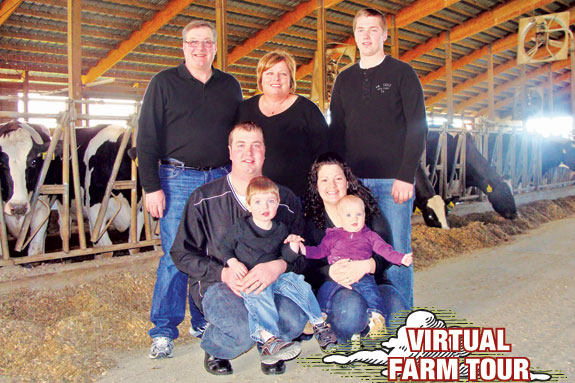
2 p.m.
Hosted by: Simon Dairy, Westphalia, Michigan
705 Milking/Family Transition
As the next generation joins the farm, the transition can be a difficult process. However, for the family of Simon Dairy Farm it has been a great opportunity to learn and grow together.
Larry and Therese Simon are in the process of transferring responsibilities to their eldest son, Brent, and are planning for a partnership with Brent and his brother, Scott, who is currently a junior at Michigan State University and working towards a degree in agri-business management.
This multi-generational team has capitalized on the diverse blend of experience, education and individual strengths. By working closely with Brent and other key members of the management team, the farm has been able to accomplish a rolling herd average of 27,072 pounds with a somatic cell count of only 97,000.
Additionally, Simon Dairy has been able to achieve a pregnancy rate of 28 percent with more than 55 percent of the herd being pregnant. Simon Dairy has been honored with the Silver Award for SCC by the Michigan Milk Producers Association and has won numerous top honors for several individual cows.
Wednesday, October 5
11 a.m.
“Making Genomic Testing Work for You”
Dr. Tom Lawlor, Director, Research and Development, Holstein Association USA
Genomic testing is evolving quickly and becoming a more cost-effective process. New options in genomic testing include 3K, 50K and High Density. Dr. Tom Lawlor will explain how these different levels of genomic information can be utilized to identify high-end breeding stock, as well as low-end animals to be culled.
Additionally, he will outline which animals you should consider testing, what the results can tell you and how to implement a test protocol for your herd. Lawlor has worked in the dairy cattle breeding and genetics industry for over 25 years. Prior to working at Holstein Association USA, he was employed at the USDA Animal Improvement Lab in Maryland and as an assistant professor at the University of Connecticut.
Lawlor was the 2009 recipient of the American Dairy Science Association’s J. L. Lush Award in animal breeding and genetics.
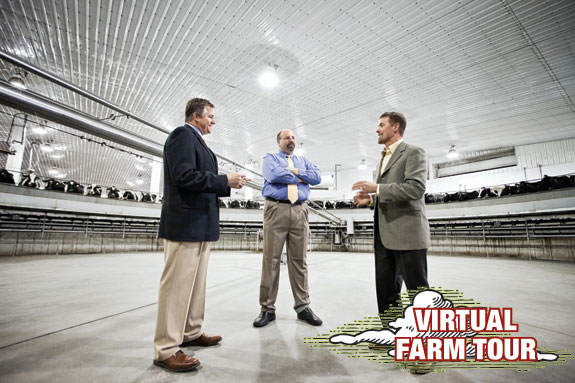
Noon
Hosted by: Rosendale Dairy, LLC, Pickett, Wisconsin
8,400 Milking/Technology and Innovation
Opened in 2008, Rosendale Dairy, LLC is the largest dairy in Wisconsin and utilizes the latest in technology. Rosendale Dairy is part of Milk Source, LLC which is a partnership between Jim Ostrom, John Vosters and Todd Willer. The partnership includes three additional dairies in Wisconsin, with a fourth one breaking ground this year.
The 8,400-cow herd is housed in two 16-row barns featuring cross ventilation. Aisles are cleared using push-pull augers that run the width of the barn and empty into a state-of-the-art sand separator. After waste and sand are separated, waste is further separated using dissolved air flotation that breaks waste into nutrients and water.
Waste water and manure is stored in three concrete-lined storage ponds with a total capacity of 73 million gallons. Rosendale contracts with local land owners for manure agreements. The herd is milked three times a day in twin 80-cow rotary parlors and has a rolling herd average of 28,000 pounds.
Last year, the dairy received the Governor’s Award for Excellence in Energy Management.
1 p.m.
“Leading the Conversation”
Jane Hillstrom, President, Hillstrom Communications
Michele Ruby, President, Ruby-Do, Inc.
People want to know where their food comes from and if it is safe. Answering tough consumer questions can be challenging. Jane Hillstrom and Michele Ruby will lead an interactive workshop to help producers develop their skills to better connect with their neighbors, communities and consumers.
Learn how to lead conversations in a positive and effective way with research-based, consumer-tested messages. Come prepared to roll up your sleeves and be part of a working session!
Jane Hillstrom is the president of Hillstrom Communications, where she has worked with a variety of clients including Dairy Management Inc., Packerland Packing, the National Cattlemen’s Beef Association, U.S. Dairy Export Council, National Milk Producers Federation, Culver Franchising Incorporated, Land O’ Lakes and others.
Michele Ruby is the president of Ruby-Do, Inc. and has the opportunity to spearhead the development of the Dairy Farming Today website and help producers develop their dairies’ stories. Both have extensive experience leading workshops and training, writing articles and presentations, and developing messaging for production agriculture to effectively communicate with consumers.
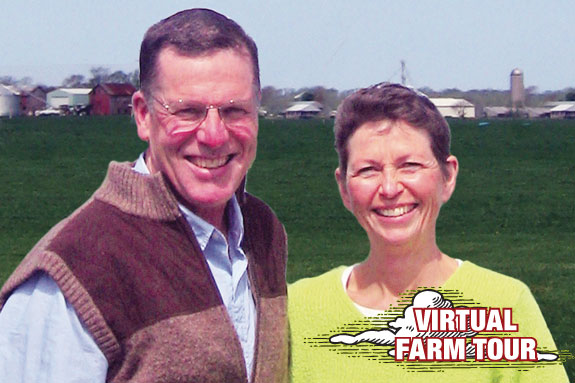
2 p.m.
Hosted by: St. Brigid’s Farm, Kennedyville, Maryland
70 Milking/ Unique Marketing
St. Brigid’s Farm was so named for the patron saint of dairymaids and scholars, which reflects the owners’ backgrounds. Judy Gifford was raised on a small dairy farm and always had a love of cows, and Dr. Robert Fry is a veterinarian whose career has been focused on the production and health of dairy cattle.
Their 55-acre farm, located on the scenic eastern shore of Maryland near the headwaters of the Chesapeake Bay, is planted in permanent pasture and home to a 70-cow seasonal calving Jersey herd. This top-producing herd was ranked third nationally for herd average Jersey Performance Index at the end of 2010.
Gifford and Fry also raise grass-fed Jersey steers that are processed and marketed locally. Since 2008, the farm has hosted a Field-to-Fork dinner, an elegant event featuring a five-course meal for 100 people set in the pasture at the farm. Local products are prepared and served while growers, including Gifford and Fry, share their stories with the diners.
It is a unique opportunity to educate neighbors about their environmental efforts and animal husbandry. They reinforce this message through their website and blog. Proceeds from the dinner are donated to charity.
Thursday, October 6
11 a.m.
“Automatic Milking: Current Status and Future Options”
Dr. Douglas Reinemann, Professor, University of Wisconsin-Madison
A new wave of automated milking technology has emerged. Dr. Douglas Reinemann will introduce a range of automatic milking technology that is now available in the U.S. and new innovations that will become available. He will also review the latest field results on milk quality in automatic milking and give recommendations on facilities and building design.
Furthermore, Reinemann will outline the best management practices for automated milking and share survey results from current users. Reinemann has been a professor at the University of Wisconsin-Madison in the Biological Systems Engineering Department for the past two decades.
During his tenure, he has directed the activities of the UW Milking Research and Instruction Lab, and he has served as the U.S. representative and chairman of the International Dairy Federation’s working group on machine milking and the U.S. representative to the International Standards Organization committees on milking machine performance and installation, and automatic milking installations.
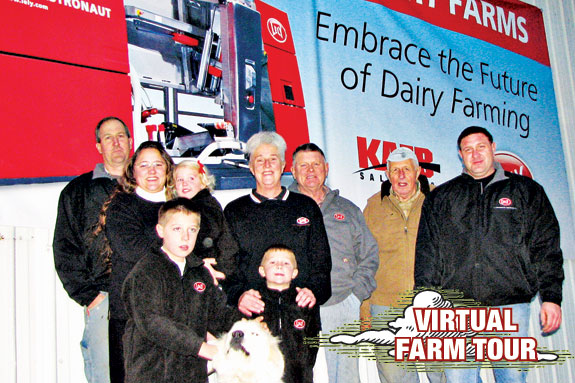
Noon
Hosted by: Nor-Bert Farms, LLC, Bremen, Indiana
140 Milking/Robotic Milkers
Norman Krathwohl never imagined when he purchased Nor-Bert Farms in 1945 that, 65 years later, three robots would be milking the herd. Nor-Bert Farm, LLC is owned and operated by Norman, his daughter and son-in law, Roger and Deb Dankert, his grandson, Jeremy Dankert, granddaughter Jennifer and her family including her husband, Monty, and their three children, Dalton, Dillon and Breanne.
Currently, Nor-Bert Farms milks 140 cows with a rolling herd average of 27,619 pounds. After a trip to the Netherlands, Roger was convinced that robotic milking could be a good fit for their operation. The family visited other dairies that had robotics incorporated into their operation and researched their options for automated milking.
In 2010, the farm broke ground to retrofit the robots into the existing farm setup. Robotic milking has been a great improvement to Nor-Bert Farms allowing for flexibility in work schedules and allows the farm to continue to grow as the family grows. The family agrees that robotic milking definitely works.
1 p.m.
“Baby Calf Nutrition: Getting Your Future Off to a Good Start”
Dr. James Drackley, Professor, University of Illinois at Urbana-Champaign
Proper nutrition during the first few weeks of life is essential to keep a newborn calf healthy and growing. Recent evidence indicates that complete nutrition is a critical determinant of future milk production and possibly longevity in the herd, making the first two weeks of life critical for future herd performance.
Managing the transition from milk to solid feeds is a second critical point in the animal’s life. Dr. James Drackley will provide background information and practical guidelines for managing these important phases of heifer rearing.
Drackley is professor of Animal Sciences and Nutritional Sciences at the University of Illinois at Urbana-Champaign. During his tenure, his research has been focused on nutrition and metabolism of dairy cows during the transition from dry period to lactation, fat feeding and metabolism, and aspects of calf nutrition and management.
Drackley has published extensively and received numerous professional awards.
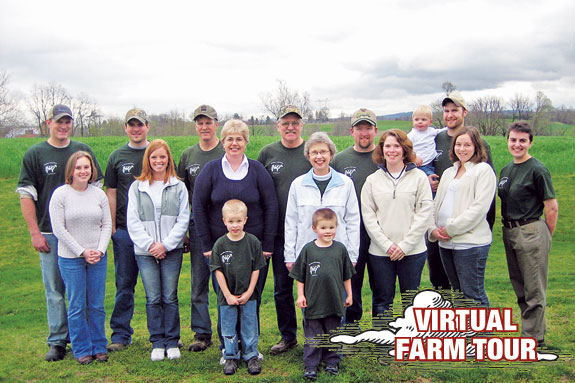
2 p.m.
Hosted by: Meadow Vista Dairy LLC, Bainbridge, Pennsylvania
648 Milking/Land Conservation and Forages
Located in the Chesapeake Bay watershed, producing quality forages while implementing best management practices for crop production is always top of mind for the Risser Family. Brothers Don and Gerald Risser, along with Don’s son, Eric, and Gerald’s son, Justin, are all partners in Meadow Vista Dairy LLC. Two of Gerald’s sons, Jason and Jordan are also involved with the day-to-day operations.
The farm is comprised of 740 acres on which corn, alfalfa, grass hay and small grain crops are grown. In 2008, the farm became 100 percent no-till cropping. The use of rye as a cover crop helps limit phosphorus and nitrogen runoff, and soil erosion. Rye is double-cropped with corn.
With detailed feed and animal records, the family is able to know the exact cost per ton of each crop. In turn, this helps to reduce wasted feed. More importantly, it helps to allocate which crops are grown, how much fuel is used to plant and harvest crops and how much fertilizer to apply.
Currently, the farm milks 648 cows with a rolling herd average of 29,357 pounds.
Click here to read Progressive Dairyman 's 2010 article about Meadow Vista Dairy.
Friday, October 7
11 a.m.
“Managing Your Margins: Practical Ways to Reduce Feed Costs and Increase Milk Price”
Dr. Normand St-Pierre, Professor, Ohio State University
Feeding the dairy herd and replacements is the single most expensive part of any dairy operation. Corn and soybean prices, along with milk prices, continue to fluctuate, making it difficult to manage price margins. There are strategies and tactics that can help your bottom line through good and bad times, other than finding cheaper corn.
Dr. Normand St-Pierre will outline ways producers can improve the margin between milk income and total herd feed costs without even using futures markets. St-Pierre is professor of Animal Sciences at Ohio State University. He is currently conducting research and extension programs in the areas of dairy farm management, information processing, decision support systems and nutritional economics and optimization.
St-Pierre has published over 300 articles in various publications and has received numerous awards for his research and extension work.

Hosted by: Blue Mound Dairy, Laverne, Minnesota
1,000 Milking/Milk Quality
At Blue Mound Dairy, efficiency and quality are the goals. Those goals extend to every aspect of the operation – from milking protocols to feed production. Blue Mound Dairy, owned and operated by Rick and Carrie Van Santen and their four sons, is nationally recognized for both milk quality and reproduction management.
Honored for six consecutive years with the Milk Quality Award, they are industry leaders in milk quality with a bulk tank SCC average of just 112,000 for their 1,000-cow herd. As a 2009 Dairy Cattle Reproduction Council Silver Award Winner, they also lead the industry in reproductive performance across their herd.
Finally, Blue Mound Dairy is able to maintain a rolling herd average of 28,500 pounds with nearly all home-grown forages. By implementing several new procedures and practices, forage digestibility is at an all-time high for both haylage and corn silage.
1 p.m.
“Improve Your SCC, 400K Beat It!”
Dr. Ynte Hein Schukken, Professor and Director Quality Milk Production Services, Cornell University
As new regulations in milk quality are being set in place, controlling somatic cell count will become more important than ever. Dr. Ynte Schukken will discuss the best management practices for milk quality with a focus on somatic cell counts.
The benefits of a lower SCC will be presented and a quick calculator to estimate the benefits to be gained from improved milk quality will be presented. He will also share a novel program to reduce cell counts on your farm that has had very successful results.
Schukken is a professor in the Department of Population Medicine and Diagnostic Sciences at the College of Veterinary Medicine at Cornell University. His research focuses on population dynamics of infectious diseases, udder health and statistical and mathematical models for animal disease research.
Schukken was also honored with the Outstanding Scientist Award in 2002 by the American Dairy Science Association.
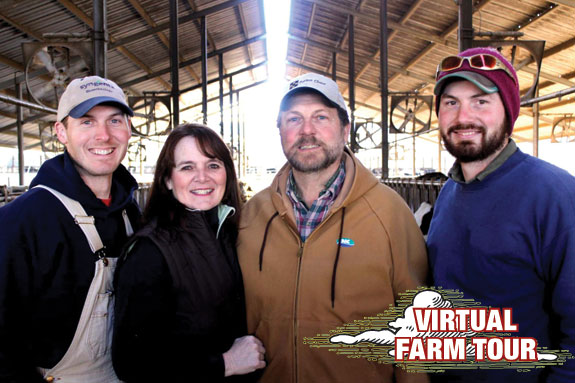
Hosted by: Myers Farms, Inc., Union Grove, North Carolina
1,200 Milking/Reproduction Success
Myers Farms strives for the very best in cow comfort, milk quality and, most importantly, reproductive performance. Barry and MaryJane Myers, along with their family, own and operate Myers Farms, Inc. The herd of 1,200 milk cows maintains a rolling herd average of 26,990 pounds with a somatic cell count of 70,000.
More impressively, Myers Farms has a 35 percent pregnancy rate. By working closely with their veterinarian, reproductive specialists and employees, they have a sound reproductive plan. After observing the voluntary waiting period of 72 days, all cows are placed on a PreSynch+Ovsynch program and then timed A.I.
Any cows checked open after 36 days post-breeding are put back into the Ovsynch program. Heifers are bred when observed in heat and animals found open or over 14 months of age are then synchronized using a CIDR.
In 2009, Myers Farms, Inc. was recognized as one of the top four herds in the nation for their reproductive success and awarded Platinum Honors by the Dairy Cattle Reproductive Association.
Saturday, October 8
11 a.m.
“Dairies, Air Quality and Climate Change – Where the Industry Stands”
Dr. Frank Mitloener, Associate Professor and Air Quality Extension Specialist, University of California-Davis
In recent years, there has been a lot of discussion about the impact dairy farming has on the environment, especially with regards to air quality. Carbon footprinting is quickly becoming a standard to measure the impact items have on the environment and could force even stricter regulations for producers.
Dr. Mitloehner will discuss the most recent findings as they relate to the impacts of the dairy industry on air quality and climate change. He will summarize the most recent regional, national and international efforts to quantify and mitigate emissions, as well as the latest developments in the area of dairies and air quality regulation and litigation.
Mitloehner is an associate professor and Air Quality Specialist in Cooperative Extension at UC-Davis. He serves as principal investigator of a broad range of air emission and mitigation studies and has authored 50 publications in refereed journals. He serves as Director of the UC-Davis Agricultural Air Quality Center.
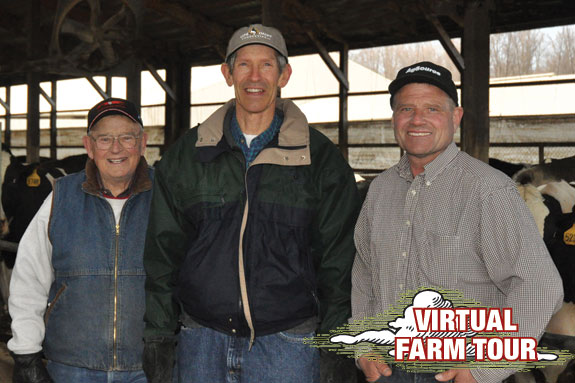
Noon
Hosted by: Maple Ridge Dairy, LLC, Stratford, Wisconsin
1,022 Milking/Transition Cow Management
Getting cows off to a good start after calving is essential to Maple Ridge Dairy, LLC. Ken Hein and his brother-in-law, Gary Ruegsegger, are partners in the dairy with assistance from Ken’s dad, Phil Hein, Jr.
Maple Ridge Dairy tracks several key areas very closely during the transition cow period including somatic cell count, feed intake and daily milk weights. When numbers appear inconsistent, the issue is immediately addressed. By doing this, the dairy addresses fresh cow problems and prevents them from becoming larger and more costly issues.
Additionally, cows off to a good start have more productive lactations, which is reflected in their rolling herd average of 31,014 pounds and a somatic cell count of 118,000.
Both Ken and Gary are members of the Professional Dairy Producers of Wisconsin and serve on numerous boards. Last year, they were honored as 2010 Master Agriculturalists. PD



